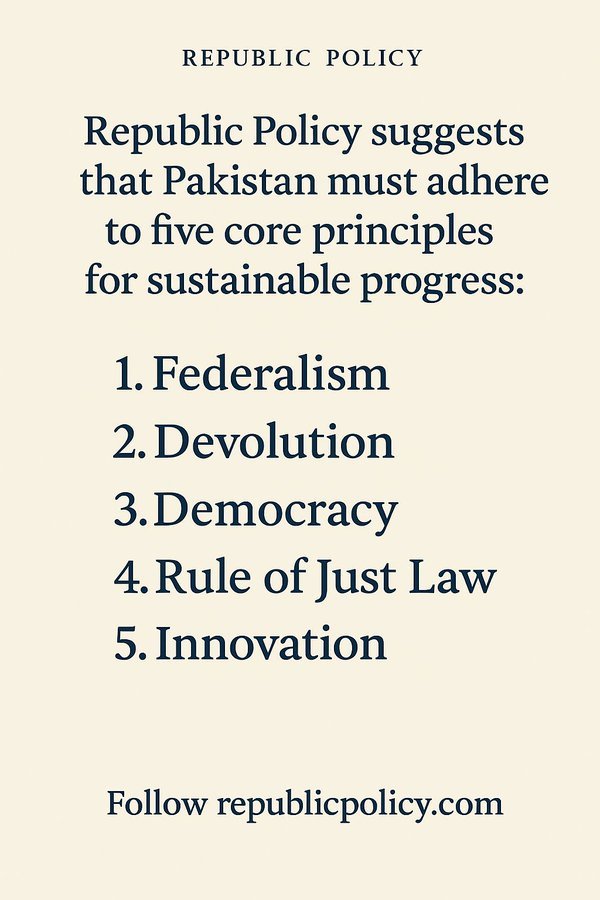Dr Bilawal kamran
Pakistan’s long-term progress depends on a coherent framework that aligns governance with constitutional values and citizen welfare. This article sets out five mutually reinforcing principles—Federalism, Devolution, Democracy, Rule of Just Law, and Innovation—that move policy from slogans to results. The aim is simple: empower institutions, protect rights, and create the conditions for sustainable growth that every citizen can feel.
Follow Republic Policy Website
Federalism: True federalism honors the Constitution’s spirit by guaranteeing provincial autonomy, fair resource distribution, and a real voice in national decision-making. When powers and revenues are allocated transparently under the NFC and comparable arrangements, provinces plan better, deliver more effectively, and trust in the federation deepens. This balance reduces political friction, respects diversity, and strengthens national unity through shared ownership of the state.
Follow Republic Policy YouTube
Devolution: Decentralization must extend beyond administrative delegation to meaningful fiscal and legislative authority for local governments. City and district councils should control local taxation, service delivery, and oversight, with transparent formulas for transfers and independent audit. When communities decide on roads, water, sanitation, schooling, and primary healthcare, services improve, leakages fall, and public trust grows because outcomes are visible and accountable.
Follow Republic Policy on X (Twitter)
Democracy: Elections are a starting line, not the finish. A democratic order requires parliamentary supremacy, impartial oversight bodies, and routine transparency in budgeting, procurement, and appointments. Protecting political pluralism and space for dissent sustains legitimacy; without these, policy continuity falters and citizens disengage. Democratic stability is the cheapest form of stability—predictable rules lower risk and encourage investment, innovation, and long-horizon planning.
Follow Republic Policy Facebook
Rule of Just Law: Equal enforcement is not enough if the law itself is unjust. Pakistan needs a rights-aligned legislative process where each bill undergoes a human-rights impact assessment, genuine public consultation, and pre-enactment judicial review for constitutional compatibility. Draconian or discriminatory statutes corrode legitimacy and push governance toward rule by law rather than rule of just law. Laws must protect dignity, due process, and proportionality—only then does enforcement earn moral authority.
Innovation: Development in the 21st century rests on knowledge and creativity. Policy should prioritize R&D incentives, digital infrastructure, and technology adoption across agriculture, manufacturing, and services. Universities and industry must collaborate through funded labs and commercialization pathways, while skills programs equip youth for AI, data, and advanced engineering. Countries that invest in innovation create better jobs, higher productivity, and resilience against global shocks.
Follow Republic Policy Website
Conclusion: These five principles are a system: federalism and devolution shape responsive governance; democracy provides legitimacy; the rule of just law safeguards fairness; and innovation powers growth. Converting them into binding commitments—through clear statutes, measurable KPIs, and independent oversight—can transform Pakistan’s state capacity and citizen outcomes. The destination is a just, innovative, and confident republic where policy delivers and people prosper.
















